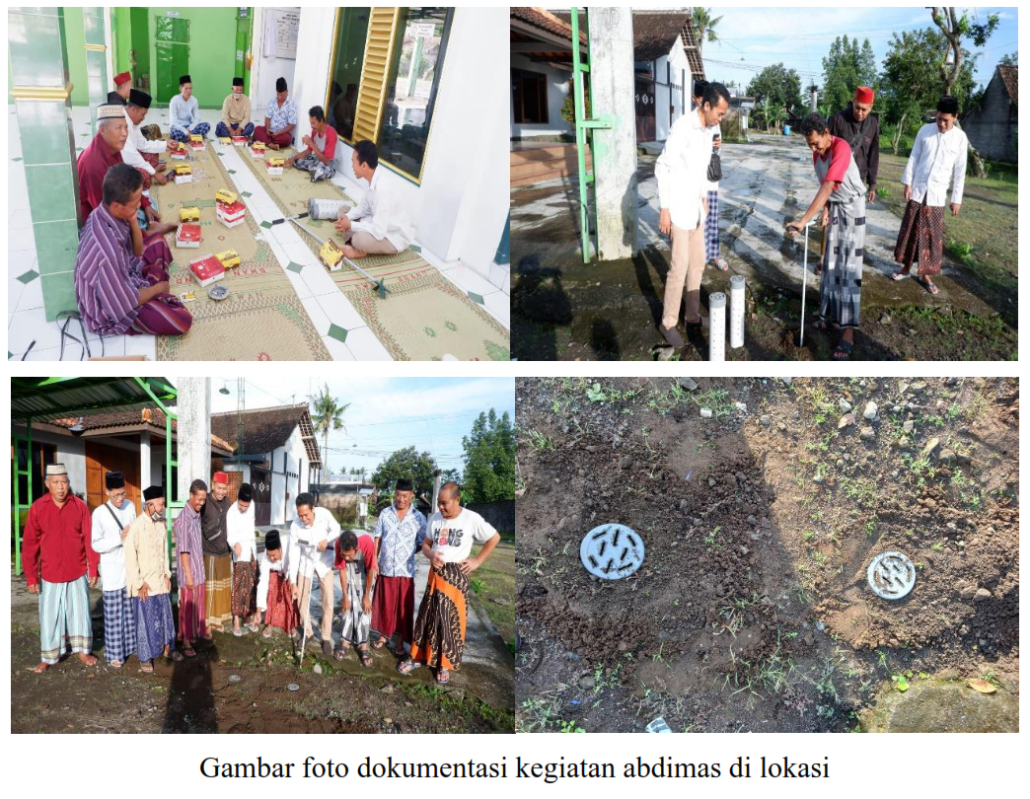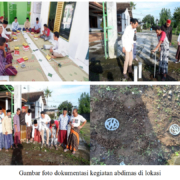ASSISTANCE IN THE DIFFUSION OF BIOPORE INFILTRATION HOLES: Reducing Rainwater Flooding and Anticipating Clean Water Scarcity in the Dry Season

(Sleman 9/1) – Referring to the report by the Meteorology, Climatology, and Geophysics Agency (BMKG) of D.I. Yogyakarta, the rainy season began in October, with the peak expected in December 2022, January 2023, and February 2023, generally predicted to peak in February 2023 (Karnawati, 2022). The high rainfall has led to rainwater flooding in the Al-Muhajirin Mosque Complex area, Tiyasan, Condongcatur Village, Depok District, Sleman, D.I. Yogyakarta. This flooding is caused by the high and evenly distributed rainfall intensity in Sleman. Additionally, the concrete paving of village roads and residential yards in recent years, unsupported by adequate rainwater runoff drainage, exacerbates the flooding.
Rainwater flooding in residential yards cannot be underestimated, as pathogenic microbes, fungi, and viruses can proliferate, causing various diseases from skin ailments to gastrointestinal illnesses (diarrhea, dysentery, etc.). Furthermore, the lack of water absorption in the open spaces of the area worsens the impact of rainwater runoff. Consequently, during long dry seasons, there is a scarcity of well water, leading to sanitation health issues and the emergence of diseases. Clean water access is urgent, as it is needed for cooking, drinking, bathing, and ablution. If clean water becomes scarce, public health deteriorates, and diseases emerge. To address the environmental and health issues around the mosque complex, a community service program titled “DIFFUSION OF BIOPORE INFILTRATION HOLE TECHNOLOGY: Rainwater Storage in the Ground to Anticipate Well Water Scarcity for Al-Muhajirin Mosque Complex Residents, Tiyasan, Condongcatur Village, Depok District, Sleman, D.I. Yogyakarta” was proposed, with presenter Feris Firdaus, M.Sc., a lecturer in the Industrial Engineering Department at Universitas Islam Indonesia. This program aims to reduce rainwater flooding and increase groundwater storage, preventing well water scarcity during the dry season.
The community service activities carried out in the area showed high community enthusiasm for implementing and diffusing the biopore infiltration hole technology. The community fully realizes that this effort is to minimize rainwater flooding in their yards and serve as a groundwater/well deposit to anticipate water scarcity in the dry season. The activities began with a training session at the mosque’s porch, attended by mosque administrators and congregants living around the mosque. The materials covered the technical concept of biopore infiltration hole diffusion, the necessary equipment, and materials, including a 1-meter-long manual soil drill shaped like a T and a 4-inch diameter PVC pipe with a perforated lid using an electric soldering iron. The next step was the practical creation of biopore infiltration holes using the equipment and materials, conducted participatorily, allowing the community to implement their knowledge with direct assistance from the facilitators.
This practical session resulted in two biopore infiltration holes, complete with perforated PVC pipes and lids ready to absorb subsequent rainwater. From these two biopore infiltration holes, it is hoped that the community can produce many more in potential flooding spots around the mosque and residential yards, allowing the technology’s benefits to be widely felt. The more infiltration holes the community has, the more abundant the groundwater deposit, achieving the Sustainable Development Goals (SDGs 2030) related to clean water access and sanitation for the community.


